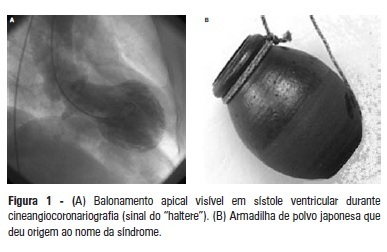
Takotsubo syndrome is characterized by predominantly medial-apical transient left ventricular dysfunction, which is typically triggered by physical or emotional stress. The present article reports the case of a 61-year-old female patient presenting with dizziness, excessive sweating, and sudden state of ill feeling following an episode involving intense emotional stress. The physical examination and electrocardiogram were normal upon admission, but the troponin I and creatine kinase-MB concentrations were increased. Acute myocardial infarction without ST segment elevation was suspected, and coronary angiography was immediately performed, which showed severe diffuse left ventricular hypokinesia, medial-apical systolic ballooning, and a lack of significant coronary injury. The patient was referred to the intensive care unit and was successfully treated with supportive therapy. As this case shows, Takotsubo syndrome might simulate the clinical manifestations of acute myocardial infarction, and coronary angiography is necessary to distinguish between both myocardial infarction and myocardial infarction in the acute stage. The present patient progressed with spontaneous resolution of the ventricular dysfunction without any sequelae.
Search
Search in:


Comments